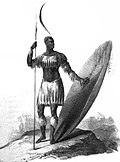Zulu Kingdom
Template:Infobox historical nation
The Zulu Kingdom, also known as the Zulu Empire, was a monarchy in Southern Africa that extended along the coast of the Indian Ocean from the Tugela River in the south to the Pongola River in the north. The kingdom grew to dominate much of what is today KwaZulu-Natal and Southern Africa.
History[edit]
The Zulu Kingdom was founded by Shaka Zulu in 1816. Shaka, a military genius, transformed the small Zulu tribe into a powerful kingdom through innovative military tactics and social reforms. His reign marked the beginning of the Mfecane, a period of widespread chaos and warfare among indigenous ethnic communities in southern Africa.
Shaka's Reforms[edit]
Shaka introduced several military innovations, including the iklwa, a short stabbing spear, and the "bull horn" formation, which allowed his forces to encircle and destroy enemy armies. He also restructured the Zulu society, creating a centralized and militarized state.
Expansion and Conflict[edit]
Under Shaka's leadership, the Zulu Kingdom expanded rapidly, absorbing neighboring tribes and becoming a dominant force in the region. However, Shaka's reign was marked by violence and internal strife, leading to his assassination in 1828 by his half-brothers, Dingane and Mhlangana.
Dingane and Mpande[edit]
Dingane succeeded Shaka but faced challenges from both internal factions and external threats, such as the Voortrekkers, Dutch-speaking settlers moving into Zulu territory. The Battle of Blood River in 1838 was a significant conflict between the Zulu and the Voortrekkers, resulting in a decisive defeat for Dingane.
Mpande, Dingane's half-brother, took over the throne with the support of the Voortrekkers and ruled until 1872. His reign was relatively peaceful, and he maintained the kingdom's stability.
Cetshwayo and the Anglo-Zulu War[edit]
Cetshwayo, Mpande's son, became king in 1872. His reign saw the kingdom's greatest challenge: the Anglo-Zulu War of 1879. The war began when British forces invaded Zululand, seeking to expand their colonial influence. Despite early victories, such as the Battle of Isandlwana, the Zulu were eventually defeated at the Battle of Ulundi, leading to the kingdom's annexation by the British Empire.
Culture and Society[edit]
The Zulu Kingdom was characterized by a strong central authority, with the king holding absolute power. The society was organized into a hierarchical structure, with the king at the top, followed by chiefs, warriors, and commoners. The Zulu people practiced a traditional religion centered around ancestor worship and believed in a supreme being known as Unkulunkulu.
Legacy[edit]
The legacy of the Zulu Kingdom is still evident in modern South Africa. The Zulu people remain the largest ethnic group in the country, and their culture and traditions continue to influence South African society. The kingdom's history is celebrated in various cultural festivals and is a source of pride for many Zulu people.
Also see[edit]
Template:African history Template:Zulu culture
-
King Shaka
-
Map of Shaka's Empire
-
King Dingane
-
Zulu warriors charging
-
King Mpande
-
Battle of Isandlwana
-
King Cetshwayo
-
King Dinizulu
Ad. Transform your life with W8MD's Budget GLP-1 injections from $75


W8MD offers a medical weight loss program to lose weight in Philadelphia. Our physician-supervised medical weight loss provides:
- Weight loss injections in NYC (generic and brand names):
- Zepbound / Mounjaro, Wegovy / Ozempic, Saxenda
- Most insurances accepted or discounted self-pay rates. We will obtain insurance prior authorizations if needed.
- Generic GLP1 weight loss injections from $75 for the starting dose.
- Also offer prescription weight loss medications including Phentermine, Qsymia, Diethylpropion, Contrave etc.
NYC weight loss doctor appointmentsNYC weight loss doctor appointments
Start your NYC weight loss journey today at our NYC medical weight loss and Philadelphia medical weight loss clinics.
- Call 718-946-5500 to lose weight in NYC or for medical weight loss in Philadelphia 215-676-2334.
- Tags:NYC medical weight loss, Philadelphia lose weight Zepbound NYC, Budget GLP1 weight loss injections, Wegovy Philadelphia, Wegovy NYC, Philadelphia medical weight loss, Brookly weight loss and Wegovy NYC
|
WikiMD's Wellness Encyclopedia |
| Let Food Be Thy Medicine Medicine Thy Food - Hippocrates |
Medical Disclaimer: WikiMD is not a substitute for professional medical advice. The information on WikiMD is provided as an information resource only, may be incorrect, outdated or misleading, and is not to be used or relied on for any diagnostic or treatment purposes. Please consult your health care provider before making any healthcare decisions or for guidance about a specific medical condition. WikiMD expressly disclaims responsibility, and shall have no liability, for any damages, loss, injury, or liability whatsoever suffered as a result of your reliance on the information contained in this site. By visiting this site you agree to the foregoing terms and conditions, which may from time to time be changed or supplemented by WikiMD. If you do not agree to the foregoing terms and conditions, you should not enter or use this site. See full disclaimer.
Credits:Most images are courtesy of Wikimedia commons, and templates, categories Wikipedia, licensed under CC BY SA or similar.
Translate this page: - East Asian
中文,
日本,
한국어,
South Asian
हिन्दी,
தமிழ்,
తెలుగు,
Urdu,
ಕನ್ನಡ,
Southeast Asian
Indonesian,
Vietnamese,
Thai,
မြန်မာဘာသာ,
বাংলা
European
español,
Deutsch,
français,
Greek,
português do Brasil,
polski,
română,
русский,
Nederlands,
norsk,
svenska,
suomi,
Italian
Middle Eastern & African
عربى,
Turkish,
Persian,
Hebrew,
Afrikaans,
isiZulu,
Kiswahili,
Other
Bulgarian,
Hungarian,
Czech,
Swedish,
മലയാളം,
मराठी,
ਪੰਜਾਬੀ,
ગુજરાતી,
Portuguese,
Ukrainian







